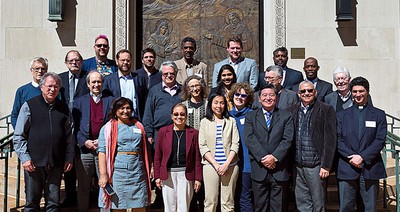Ecumenical group seeks transformation ‘for the good of all God’s creations’
June 26, 2018
An ecumenical panel that includes leadership of the World Communion of Reformed Churches has taken further steps to determine, in its words, how “to build a world that better resembles God’s true kingdom.”
 The third meeting of the Ecumenical Panel on a New International Financial and Economic Architecture (NIFEA) took place April 21–22 to coincide with the third United Nations Economic and Social Council Forum on Financing for Development.
The third meeting of the Ecumenical Panel on a New International Financial and Economic Architecture (NIFEA) took place April 21–22 to coincide with the third United Nations Economic and Social Council Forum on Financing for Development.
The panel was called to order with a reminder that “We are meeting to update the NIFEA plan and together make a deepened commitment to build a world that better resembles God’s true kingdom.” This panel seeks to analyze the signs of the times for the economy and the earth by reconnecting finance to real economy, dismantling structures that protect the corrupt, and building up new structures that better respond to current economic, political, social and ecological contexts.
The NIFEA panel was born as a response to the 2012 “São Paulo Statement: International Financial Transformation for an Economy of Life.” Leaders from the World Council of Churches (WCC), World Communion of Reformed Churches (WCRC), Council for World Mission (CWM) and Lutheran World Federation (LWF) brought together the Ecumenical Panel on a NIFEA — composed of experts in finance, economics, sociology and theology — with the mandate to develop an advocacy plan to “give legs” to the São Paulo Statement.
Since it was drawn up in January 2014, there have been significant developments in global economic, political, social and ecological landscapes that directly affect the NIFEA Plan. The panel called this third meeting to work on a new strategy to address the issues at hand. For this meeting, the panel also included members of the Roman Catholic faith and civil society.
The group worked together over two days to identify emerging and persisting elements of economic and climate injustice, and strategized new actions and partnerships to advocate the analysis and transformation of NIFEA.
The group discussed the following key elements to move their work forward:
- The importance of creating a culture of accountability, putting financial observatories in place, and developing new, just financial structures
- Forgiveness as the starting point to pave the way for reconciliation, restitution and recovery
- Strengthening the coalitions of different movements (economical, ecological, social) and not compartmentalizing them; linking poverty, ecology and inequality as a single issue
- Encouraging governments to invest in ecological advancements
- Mobilizing by informing communities, bringing shocking data to the fore to stir people into action
- Working on taxation issues at the national and global level; joining with other civil society groups like Oxfam
- Changing the narrative by working together with the sciences and other faiths, with a sense of humility and openness, and joining forces with social movements
- Changing our own lifestyles by examining gender justice and ecological living within the church
- Continuing to rally against things that obscure the gospel
Athena Peralta, WCC program executive for the economy of life, said, “For WCC, NIFEA is a key priority. Our two pillars are economy for life and ecological justice, so NIFEA is at the center of the work we are doing.”
Collin Cowan, CWM general secretary, said, “The real issue at hand is the dignity of humanity and the integrity of creation. CWM is committed to this journey, but we cannot and must not do it alone. We need a band of disciples who are committed to justice and peace and focused on a mission for life in fullness for all creation.”
Chris Ferguson, WCRC general secretary, concluded the meeting by saying, “We ask the question: What are the one or two compelling things we can do together that would be so strategic, it would bring about a powerful and dramatic change for the good of all God’s creations? This is a commitment we are making to economic and ecological transformation with justice as our center.”
Phil Tanis, World Communion of Reformed Churches Communications
Today’s Focus: Economic and Climate Justice
Let us join in prayer for:
PC(USA) Agencies’ Staff
Jon Reinink, PMA
Martha Reisner, BOP
Let us pray:
Lord, the book of Isaiah tells us, “Do not remember the former things, or consider the things of old. I am about to do a new thing; now it springs forth, do you not perceive it?” Guide us toward new things that will transform our world according to your will, that the world will better resemble your holy kingdom. In Jesus’ name we pray. Amen.
Daily Readings
Morning Psalms 123; 146
First Reading Numbers 16:20-35
Second Reading Romans 4:1-12
Gospel Reading Matthew 19:23-30
Evening Psalms 30; 86